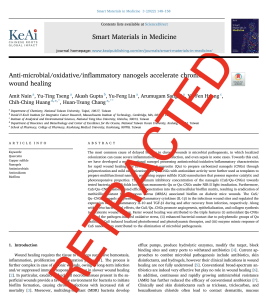A study in the journal Smart Materials in Medicine has earned a retraction, seemingly not because of scholarly malfeasance or an inadvertent oversight, but because of a “lack of agreement on affiliation format.”
The crucial fact seems to be that almost all of the article’s authors, including its two senior authors, list affiliations in Taiwan, raising the question if the retraction is based on the geopolitical dispute about whether Taiwan is an independent nation or part of China.
The article, “Anti-microbial/oxidative/inflammatory nanogels accelerate chronic wound healing,” was published online in late 2021. The journal is not indexed in Clarivate’s Web of Science, although there are 10 citations of the article listed on the article’s web page as of January 12. There is no Twitter chatter indicating anything amiss with the article’s conclusions or methods, and no discussion about it on PubPeer.
It’s unclear when exactly the paper was retracted. Its cryptic retraction notice states:
Due to the lack of agreement on affiliation format between authors and the owner of the journal, this article has been retracted at the request of all authors, the Editors-in-Chief and the owner of the journal.
Smart Materials in Medicine is published by Elsevier on behalf of KeAi Communications, an open access publisher based in Beijing. According to KeAi’s website, Elsevier cofounded the publisher with China Science Publishing & Media Ltd, and the company “believe[s] in the global impact of research from China.”
The Chinese government has attempted to influence scientific publishing in other ways before, resulting in publishers “self-censoring content on ‘sensitive’ topics,” according to Times Higher Education.
Elsevier did not reply to our requests for comment. We also did not hear back from the journal’s editor, Donghui Zhu of Stony Brook University in New York. The study’s corresponding authors – Huan-Tsung Chang of the National Taiwan University in Taipei and Chih-Ching Huang of the National Taiwan Ocean University and Kaohsiung Medical University – also did not reply to our requests for comment. So the exact nature of the “lack of agreement on affiliation format” remains unknown.
That said, Elsevier includes this familiar disclaimer on the journal’s editorial board listing, though it doesn’t appear on the retracted article page:
All members of the Editorial Board have identified their affiliated institutions or organizations, along with the corresponding country or geographic region. Elsevier remains neutral with regard to any jurisdictional claims.
Update, 1730 UTC, January 17, 2023: Following publication of this post, Retraction Watch received a copy of an email that Qi Yi, the publisher of Smart Materials in Medicine, sent to all authors of the paper, on August 25, 2022. The email stated, in part, that a review of the latest papers in the journal found that for the article at issue, “there is no China added in the Taiwan authors’ affiliation. As a Chinese publisher, KeAi (the owner of Smart Materials in Medicine) shall be governed according to the policy which is that ‘China’ must be added as the country.”
The email acknowledged that adding China as the country “may somehow jeopardize author’s position/career in Taiwan.” Yi wrote that he’d conferred with senior author Huang, and that Huang “has to propose to retract the paper.” (emphasis original) Yi’s email asked all the other authors if they agreed to retract, with a week to respond.
Like Retraction Watch? You can make a tax-deductible contribution to support our work, follow us on Twitter, like us on Facebook, add us to your RSS reader, or subscribe to our daily digest. If you find a retraction that’s not in our database, you can let us know here. For comments or feedback, email us at [email protected].

Taiwan is a part of China.
An obvioulsy propaganda comment.
They don’t think so. At least, they don’t consider themselves under the authority of the current government of the Chinese mainland.
The editors did not yet cancel one other article from Taiwan authors: https://www.sciencedirect.com/science/article/pii/S2590183422000412.
First of all, a good paper should find outlets other than this online journal. There will always be disputes on territorial jurisdiction between China and Taiwan unless the one-China policy is abandoned even by China. As for scientists from Taiwan, I strongly advce avoiding China-based journals. There are many, many other good journals that respect afflilaiton the authors freely choose to be with.
Taiwan has never belonged to the People’s Republic of China. I think this shows that it is right to consider the possibility of an armed invasion of Taiwan by China as a major international risk.